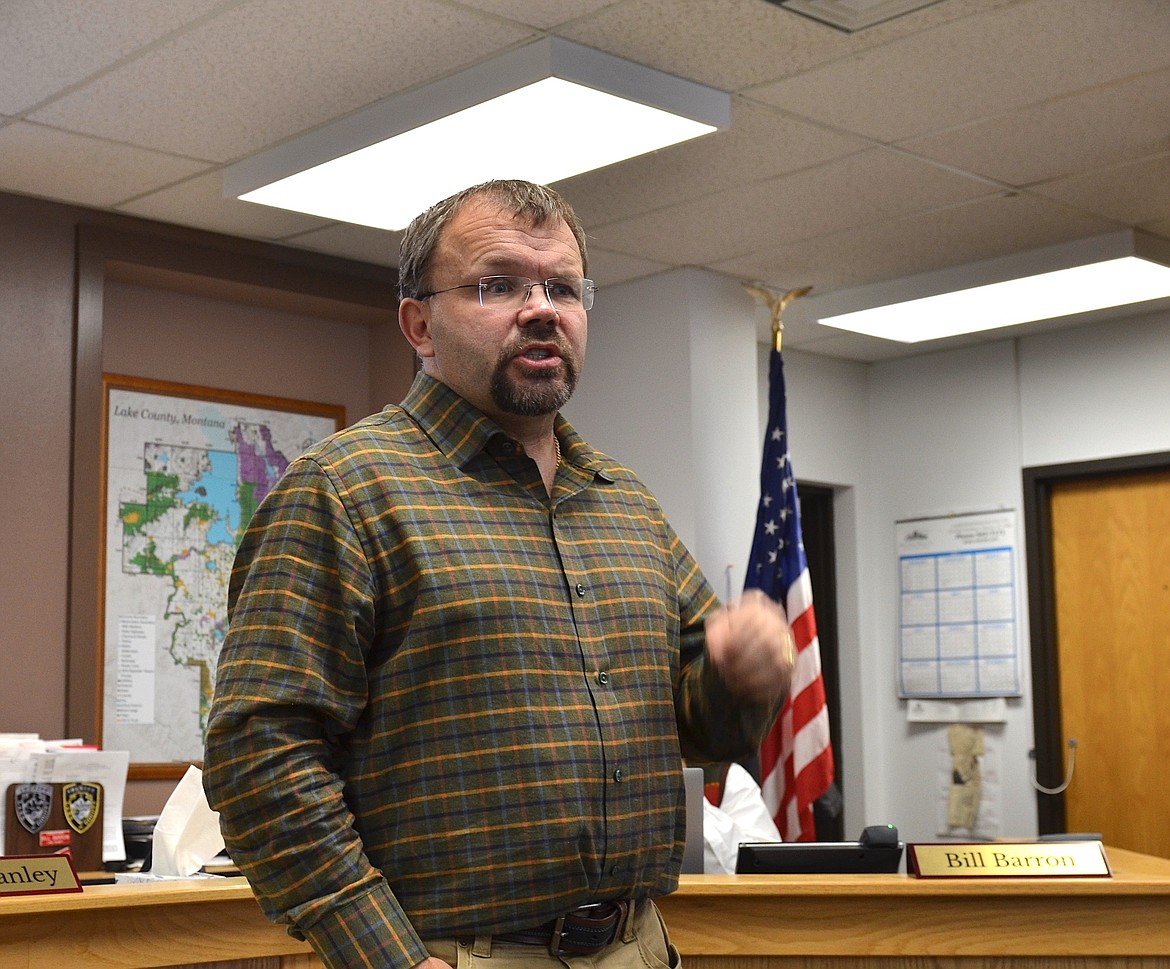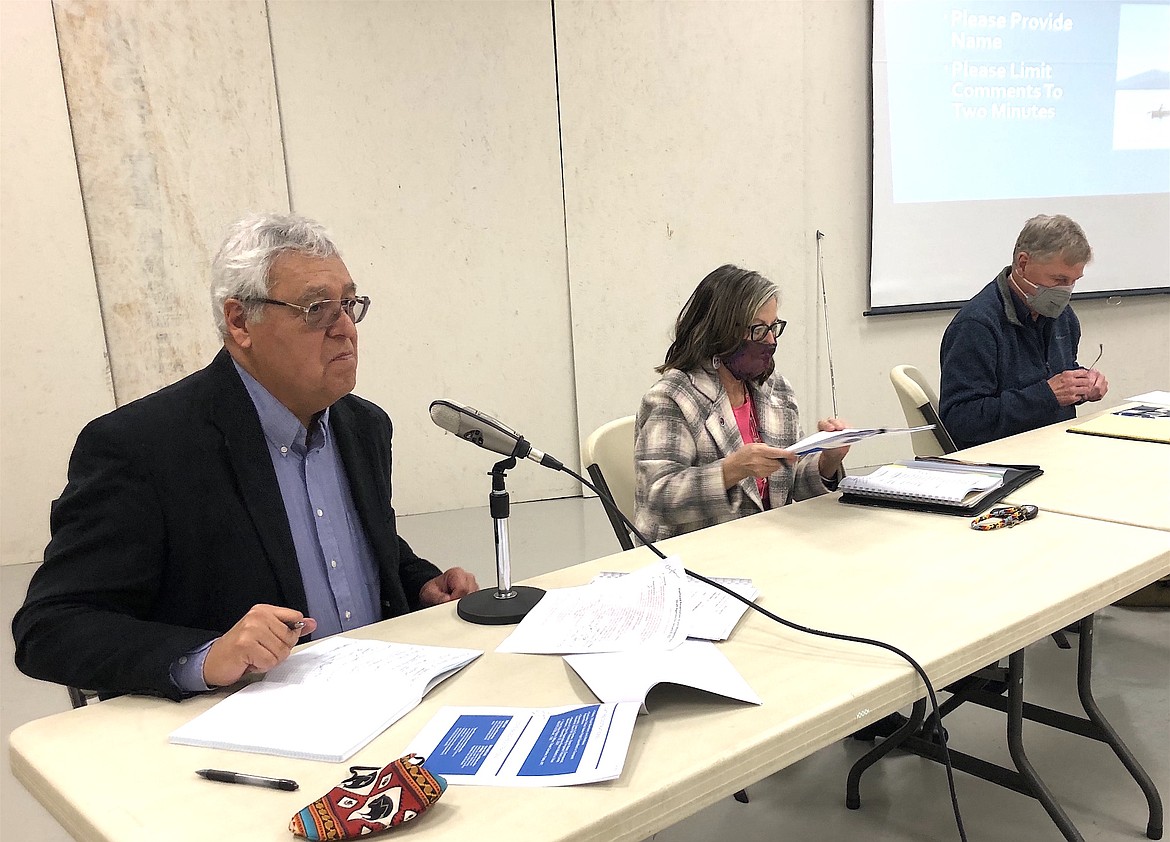The Wrap: Stories we’ll continue to cover in the New Year
HAYDEN BLACKFORD | Hagadone News Network | UPDATED 3 years, 1 month AGO
Lake County was bursting with news in 2022, from the establishment of a new Water Management Board last January, to a move by Lake County in December to remove itself from Public Law 280. Here are the stories we’ll continue to track in the New Year:
CSKT COMPACT & FLATHEAD RESERVATION WATER MANAGEMENT BOARD: After years of often contentious negotiations dating back to the 1980s, the CSKT Water Compact was first passed by the Montana Legislature and signed by then-Governor Steve Bullock in 2015. A final version was approved by the U.S. Congress and signed by then President Trump and approved by the Tribal Council in December 2020 as the Montana Water Rights Protection Act.
The signature on Sept. 17, 2021, by Interior Secretary Deb Haaland triggered implementation and enacted the Unitary Administration and Management Ordinance, which is now the law governing all water rights on the reservation – tribal, state and federal.
The law also established the Flathead Reservation Water Management Board as the exclusive regulatory body governing water appropriation and changes to existing uses on the reservation. The board, which began meeting last January, is comprised of two members appointed by Gov. Gianforte, Roger Noble and Kenneth Pitt; two selected by the Tribal Council, Clayton Matt and Teresa Wall-McDonald; and a fifth selected by the board itself, Georgia Smies.
In the past 12 months, the board has approved more than 220 applications for domestic wells, established the Office of the Engineer at the old Masonic Lodge in Ronan, and hired Ethan Mace to serve as water engineer.
What’s Next: Final approval of the CSKT Compact comes from the Montana Water Court, which recently extended its deadline for public comment to Feb. 9. Meanwhile the Office of the Engineer and Water Board continue to ramp up staffing, and plan to begin moving through a backlog of applications, both for domestic use and for larger developments, in the coming year.
LAKE COUNTY JAIL: A lawsuit accusing Lake County of inhumane and discriminatory conditions in its jail was filed in April 2022 with the U.S. District Court in Missoula. Since then, Federal Judge Donald W. Molloy has ruled that the class-action lawsuit may move forward against Lake County and the State of Montana, although he limited the number of inmates who could join the lawsuit. It’s the second such suit filed against the county in the past three decades.
The lawsuit lists dozens of allegations against the jail. Complaints from former and current inmates include little or no opportunity for exercise, suppression of Native American religious practices and no reasonable opportunity for visitation or consultation with legal counsel.
Although Lake County deployed federal CARES Act money to make improvements last year, county officials admit the jail is overcrowded and underfunded. They claim they can’t afford to improve conditions without more financial aid from the State of Montana to cover additional costs incurred by Public Law 280, a law that places the responsibility on the state and county to investigate, prosecute and hold Native Americans on the Flathead Reservation accused of felonies.
What’s next: While the lawsuit edges forward, there are efforts underway – either by legislative action or court order – to seek monetary contributions from the state that could be used to help improve the jail situation.
BISON RANGE: For members of the Confederated Salish and Tribes a monumental shift took place in 2022, with the Tribes regaining ownership of the 18,800-acre Bison Range from the federal government.
U.S. Secretary of the Interior Deb Haaland, the nation’s first Native American cabinet member, and other dignitaries were on hand May 21 for the culmination of a vibrant three-day celebration of the restoration of the Bison Range to tribal ownership.
In addition, the Montana Historical Society’s board of trustees has agreed to return Big Medicine, the iconic white buffalo, to the Tribes.
What’s Next: We’ll be looking at ways the Bison Range continues to change and evolve under tribal ownership.
SCHOOL BONDS FAIL AND PASS: Two bond issues for the Polson School District were defeated during school elections May 3, by a slender margin of 44 votes in the elementary district, and a sizeable loss by 242 votes in the high school.
Polson’s bond issue, if passed, would have raised $32.1 million for renovations and additions to Cherry Valley, Linderman and Polson Middle School, and $17.76 million for high school additions and improvements. All four schools would have received enhanced safety and security features.
Six months later, Arlee voters approved two bond issues in November’s election, clearing the way for the district to build a new 20,000-square foot structure to house grades 3-6.
District residents authorized the district to sell and issue general obligation bonds for up to $6 million, to be repaid by taxpayers over the next 25 years, and authorized the district to sell and issue federal Impact Aid revenue bonds for up to $3 million at no cost to taxpayers.
The total project will cost an estimated $14.5 million and includes an additional $4 million generated by an Impact Aid grant, and another $1.5 coming from the federal Elementary and Secondary School Emergency Relief (ESSER) fund.
What’s Next: Look for more on Arlee’s building project and how Polson is coping with issues of safety and overcrowding.
YES TO MARIJUANA: During last June’s election, Lake County voters resoundingly favored taxing recreational marijuana, 6,355 to 1,672; and by a slimmer margin, 4,143 in favor and 3,857 against, taxing medical marijuana.
What’s Next: How will local jurisdictions – including city governments in Polson, Ronan and St. Ignatius, and the county commissioners – allocate proceeds from pot sales?
ARLEE GRAVEL PIT: After the 2021 Montana Legislature passed a bill that was intended to ease the permitting process for open pit mines, commonly referred to as gravel pits, an open pit mine was proposed in the Jocko Valley near Arlee. The mine could be over 150 acres and will include an asphalt smelter.
The gravel pit became the target of local opposition but not soon enough, as the date to set a public hearing – the only real opportunity to formally oppose the pit after the new legislation’s passage, according to local spokespeople – had already passed.
Riverside Contracting’s application has already received two letters of deficiency from the Department of Environmental Quality (DEQ), but they are likely to apply again soon.
Although voices like the Confederate Salish and Kootenai Tribes and Garden of One Thousand Buddhas have asked the state to look more deeply into the environmental and local impacts of the mine, it's a waiting game to see what the DEQ will do.
What’s Next: The State of Montana may approve the Arlee open-pit mine or opt to open the permit up to a more stringent environmental review process if it finds that the impacts of the pit are likely to be significant.
The legislation that reduced red tape for the pits, HB 599 sponsored by Steve Gunderson R-Libby, may be changed in the upcoming legislative session. According to reporting by the Western News, Gunderson publicly criticized the permitting process of an open-pit mine in his own community and discussed proposing changes to the permitting process for the next legislative session.
MEGA DATA CENTER: Despite numerous press reports last June announcing future plans to build a 50-megawatt data center in Polson, it’s clear that the project appears to be in limbo.
First announced June 3 during the Montana “On The Rise” Economic Summit, Gov. Greg Gianforte’s office touted an investment to build the center in concert with Canadian entrepreneur and investor Kevin O’Leary (of “Shark Tank” fame), Bitzero CEO Akbar Shamji, and the Confederated Salish and Kootenai Tribes, represented at the conference by Tribal Secretary Martin Charlo.
If built, the center could provide the computing muscle required by bitcoin miners, who use supercomputers to solve complex equations, as well as other web-based businesses.
The announcement and subsequent press coverage raised ample speculation about the center, which would reportedly utilize renewable power generated by Séliš Ksanka QÍispé Dam, managed by the tribal for-profit business, Energy Keepers, on behalf of CSKT.
However, it’s not a done deal, cautioned Energy Keepers CEO Brian Lipscomb in an interview last July. “We have no agreement to sell these guys – or any other bitcoin miner – electricity,” he said. “We have conversations with bitcoin mining entities pretty regularly – always inquiring whether we have the electricity or if there’s an opportunity to buy electricity from us.”
What’s Next: With the cryptocurrency industry in freefall, is there still a future for the kind of large hydro-powered data center proposed for the Flathead Reservation?
CASINO ANNEXATION GO OR NO GO? The most controversial topic before the Polson City Commission last year was the proposed annexation of nearly 80 acres of land belonging to the Confederated Salish and Kootenai Tribes, and located west of the Polson bridge.
During a presentation made May 2 to the commission, the Tribes outlined plans to build a 26,100-square-foot casino on the site, with access from Irvine Flats Road. The first phase would include the casino, with future plans including a hotel and events center, RV park, residential housing and a commercial area.
If built, the project would shift most gaming operations now housed at KwaTaqNuk Resort to the new facility, which could accommodate up to 350 machines (the resort now has 227). KwaTaqNuk would then revert to its original purpose, serving as a destination resort and restaurant, with a limited number of gaming machines.
At its meeting July 7 the commission agreed to postpone a final vote, pending answers to concerns largely about traffic congestion
What’s Next: While the commission will most likely revisit the matter in 2023, nothing is on the agenda yet.
SHORT-TERM VACATION RENTALS: No one disputed the fact that short-term vacation rentals are proliferating in Lake County during a hearing in mid-July in the overflowing county commission chamber. But most people in the room and on Zoom were not putting out the welcome mat – especially in the area under consideration for a zoning variance along Rocky Point and Baypoint roads, northwest of Polson.
At the conclusion of that public hearing, commissioners voted to adopt the City/County Planning Board’s recommendations, and to deny the Wold family’s request to overlay a zoning variance that would have allowed for short-term rentals in the area along Rocky Point Road and simultaneously created regulations to govern those rentals.
Currently, the county has no regulations in place regarding rentals for periods under 30 days. While those rentals are considered commercial businesses, many of them operate in areas zoned residential, and hence violate the zoning codes. But without any regulations in place, the county has no mechanism to monitor this booming industry.
What’s Next: Will local governments decide to regulate short-term rentals in 2023?
ROAD RELIEF ON ITS WAY: Officials learned in mid-August that Lake County will receive nearly $13 million from the U.S. Department of Transportation to fully rebuild three critical stretches of road over the next few years.
The $12.9 million Rebuilding American Infrastructure with Sustainability and Equity (RAISE) grant – one of four awarded statewide – will finance rebuilding and paving projects on Dublin Gulch Rd., a short section of Moiese Valley Rd. and North Reservoir Rd., which will also get a bike/pedestrian lane. All three roads provide important links to state highways, offer alternative routes during traffic disruption along the Hwy. 93 corridor, and are essential for ferrying commercial and agricultural products and services.
Lake County road supervisor Jay Garrick called the grant “a huge win for the county. It’ll save us tens of thousands of dollars annually in just maintenance costs on those roads.”
What’s Next: The county is preparing to interview engineers, with design, environmental review and permitting to follow this year. Work on the three projects is slated to begin in 2024 and be completed in 2025.
IRRIGATION FEES: Just a week after meeting with around 250 disgruntled irrigators Aug. 30 at the Ronan Community Center, Lake County Commissioners convened in early September to reconsider a controversial resolution that would have removed the county from the chore of collecting irrigation fees.
The resolution, initially approved by two of the three commissioners on July 20, enumerates reasons the commissioners believe the county treasurer should not be responsible for billing, collecting and distributing operation and maintenance fees for the Flathead Indian Irrigation Project.
The move, which would have wreaked havoc with fee collection for next year’s irrigation season and conceivably led to a shutdown of the irrigation project, was postponed until 2023, giving the county an additional year to sort matters out with the irrigation districts and, hopefully, the state.
Meanwhile, a letter was sent to the state attorney general, seeking an opinion on who is responsible for billing, collecting and dispersing fees for the districts and the Bureau of Indian Affairs, which manages the Flathead Indian Irrigation Project.
What’s Next: County Commissioner Gale Decker said last week the commission has not received an opinion from the Attorney General on irrigation fee collections, despite two attempts to communicate with that office. Decker also believed that the Mission/Jocko District also requested an opinion from the AG.
Sen. Dan Salomon, a Ronan-area farmer and member of the Senate Agriculture, Livestock and Irrigation Committee, has drafted legislation for the upcoming session that would clarify the matter in favor of irrigators.
“State law is crystal clear that all counties shall collect assessments for irrigation districts,” he wrote in an email. “There is no penalty if they don't so I am proposing a penalty for counties that blatantly insist on breaking the law.”
ANIMAL SHELTER UNDERFUNDED, OVERWHELMED: Stray dogs and cats were overrunning Mission Valley Animal Shelter (MVAS), and the nonprofit, no-kill shelter located south of Polson announced in October that beginning Nov. 1, the shelter would no longer accept stray animals found in the city limits of Polson, Ronan or St. Ignatius – communities that all have animal control ordinances. Instead, those animals are now the responsibility of municipal authorities.
In addition, stray animals found south of Ronan to the Missoula County line are now referred to the Arlee Rehabilitation Center or Life Savers Animal Rescue, and animals found in or on Tribal Housing properties are referred to CSKT Housing Animal Control.
“We have way too many animals,” said board member Sharon Hawke, who called the situation at the shelter an ongoing crisis.
What’s Next: Hawke is concerned that many meetings over the past year between the county, Tribes and municipalities have yet to yield meaningful relief for the shelter or enforceable animal control ordinances.
“There is no forward progress and meetings and communications have been non-existent for several months,” she wrote this week. Meanwhile, she says the shelter continues to struggle with an ever-increasing number of stray dogs and the ongoing challenge of recruiting and keeping stable work forces at MVAS and the thrift store in Polson that helps support it.
“Bottom line is that we continue to be an asset to the community and the lost and homeless animals,” she wrote. “But sustainability is bleak long term without help from the governments that bear ultimate responsibility for the problem.”
U.S. 93, RONAN-NORTH: Expect traffic delays this year as construction continues on a section of U.S. Highway 93 from Lake’s Corner south to Round Butte Road in Ronan. The project, which adds two lanes and a bike trail, began in November with relocating utilities and removing topsoil and a 54-inch irrigation pipe. The old Don Aadsen Ford building and Tribal Health offices in Ronan were demolished.
What’s Next: Contractors will start building a new southbound lane this spring, which will funnel traffic down to one lane, and require some traveling on gravel. Bob Vosen, Missoula District administrator for the Montana Department of Transportation, anticipates delays especially as summer traffic picks up, but hopes those can be limited to 15 minutes.
The project sets the stage for eventually building a southbound couplet through Ronan. DOT is also working with the Confederated Salish and Kootenai Tribes and other entities to wrangle a large grant that might help complete the last two significant phases of the highway corridor: from Red Horn/Dublin Gulch roads up Post Creek Hill and the Ninepipe corridor from Brooke Lane to Gunlock Road. Still no word on easing summer traffic congestion through Polson though.
PUBLIC LAW 280: A unique agreement that has shaped law enforcement in Lake County and on the Flathead Reservation for nearly 60 years, has reached “a breaking point,” according to county officials.
The agreement’s future may be dictated by a tangled web of legal and legislative actions, brought into sharper focus in Dec. 12 when the Lake County Commissioners unanimously approved a resolution of intent to withdraw from the agreement.
The agreement has given the State of Montana felony criminal jurisdiction over tribal members since 1965. However, Lake County has never been reimbursed for the costs it incurs to arrest, investigate, prosecute and house prisoners – an expense that’s ballooned over the years to an estimated $4 million annually.
What’s Next: At the close of a public hearing, held Tuesday, Jan. 3, in the courthouse, commissioners unanimously voted to withdraw from the agreement effective May 26.
Meanwhile, the State of Montana has asked Judge Amy Eddy from the 11th Judicial District in Flathead County to dismiss a lawsuit filed by the county seeking reimbursement from the state. The Missoula law firm of Reep, Bell and Jasper, which represents Lake County, is currently preparing a brief, due in mid-January, in opposition to the Motion to Dismiss.
Sen. Greg Hertz of Polson has drafted legislation that would require the state to contribute to the cost of enforcing Public Law 280. However, his Lake County counterpart, Sen. Dan Salomon, recently voiced skepticism that passing a bill favoring one county over the others could be accomplished in the upcoming session.
ARTICLES BY HAYDEN BLACKFORD

Flower Lake Road paving enhances access to recreation
Thanks to the perseverance of the Libby Outdoor Recreation Association, a section of Flower Lake Road is now paved.
The brouhaha over BORZ designations in Lincoln Co.
What are BORZ and what do these designations mean?

Young professional spends summer aiding Libby Clinic
The disparity between urban and rural healthcare is something that organizations are trying to bridge with exposure.







